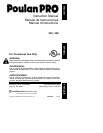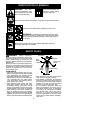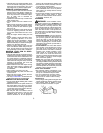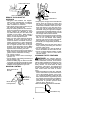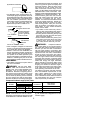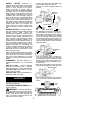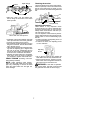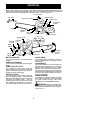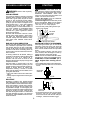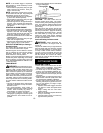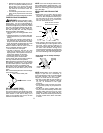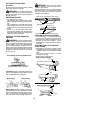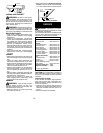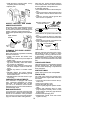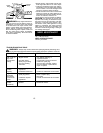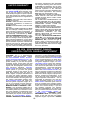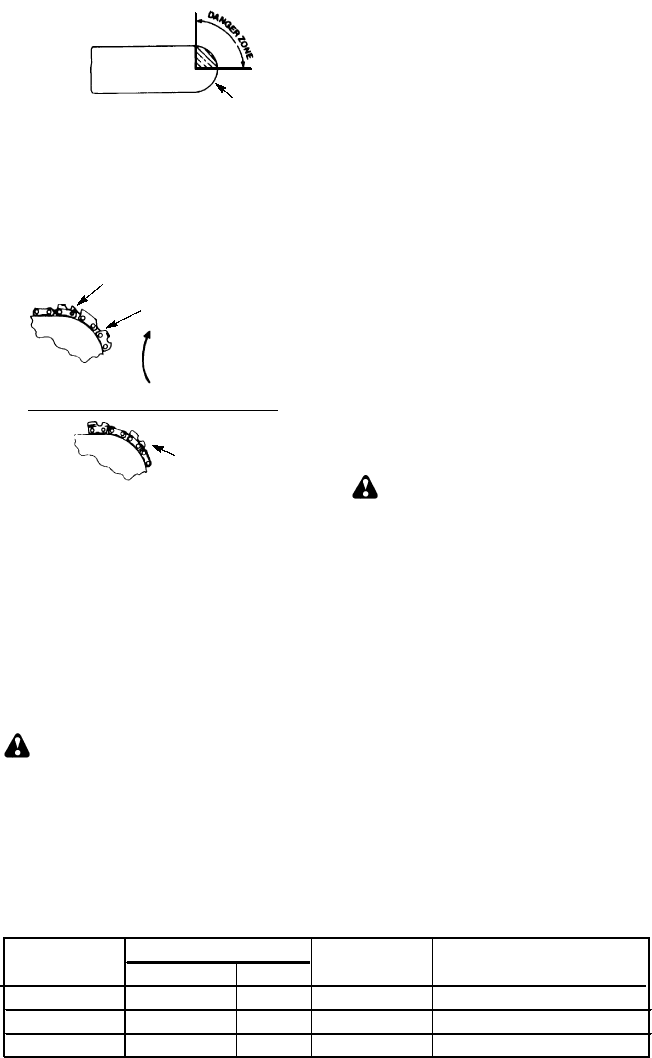
5
Symmetrical Guide Bar
Large Radius Tip
S
Low- Kickback Chain, designed w ith a con-
toureddepth gaugeand guar dlink w hichde-
flectkickbackforceandallowwoodtogradu-
ally ride i nto the cutter. Low-Kickback Chain
has m et kickback performance r equire-
mentswhentested ona r epr esentativesam-
ple of chain saws below 3.8 cubic inch
displacement specified i n A N SI B 175.1.
Low--Kickback
Chain
Not a Low--Kickback Chain
Can Obstruct
Material
Contoured Depth Gauge
Elongated Guard Link
Deflects kickback
force and allows
wood to gradually
ride into cutter
S
Front Handguar d, designed to r educe the
chanceof yourleft handcontactingthechain
if your hand slips off the f r ont handl ebar.
S
Position of front and rear handlebars, de-
signed with distance between handles and
“in-line”with each other. The spread and “in-
line” position of the hands provided by this
designworktogetherto givebalance andre-
sistanc e in contr o lling the pivot of t he saw
back towar d the oper ator if kickbackoccurs.
CHAIN BRAKE
S
Chain Brake, designed to stop the chain in
the event of kickback.
WARNING:
WE DO NOT REP-
RESENT AND YOU SHOULD NOT AS-
SUME THAT THE CHAIN BRAKE WILL
PROTECT YOU IN THE EVENT OF A
KICKBACK. Kickback is a lightning fast ac-
tion which throws the bar and rotating chain
back and up toward the operator. Kickback
can be caused byallowing contact of the bar
tip in the danger zone with any hard object.
Kickback canalsobecaused bypinching the
sawchainalongthetopofthe guidebar. This
action may push the guide bar rapidly back
toward the operator. Either of these events
may cause you to lose control of the saw
which could result in serious injury or even
death. DONOT RELYUPON ANY OFTHE
DEVICES BUILT INTO YOUR SAW. YOU
SHOULDUSE THESAW PROPERLYAND
CAREFULLY TO AVOID KICKBACK. Re-
duced--kickback guide bars and low--kick-
back saw chains reduce the chance and
magnitude of kickback and are recom-
mended. Yoursawhas alowkickback chain
and bar as original equipment. Repairs on a
chain brake should be made by an autho-
rized servicing dealer. Tak e your unit to the
place of purchase if purchased from a ser-
vicing dealer, or to the nearest authorized
master service dealer.
S
Tip contact in some cases may cause a
lightning fast reverse REACTION, kicking
guide bar up and back toward operator.
S
Pinching thesawchain along thetop ofthe
guide bar m ay push the guide bar rapidly
back toward the operator.
S
Either of these reactions maycause youto
lose control of the saw which could result
in serious injury. Do not rely exclusively
upon safety devices built into your saw.
WARNING:
Computed kickback
angle (CKA) listed on your saw and listed in
the CKA table below represents angle of
kickback your bar and chain combinations
will have when tested in accordance with
CSA andANSIstandards. Whenpurchasing
replacement bar and chain, considerations
should be given to the lower CKA values.
Lower CKA values represent safer angles to
the user, higher values indicate more angle
and higher kick energies. Computed angl es
represented in the non-ac tivated column in-
dicate total energy and angle associated
without activation of the chain brake during
kickback. Activated angle represents chain
stopping time relative to activation angle of
chain brake and resulting kick angle of saw.
In all cases lower CKA values represent a
safer operating environment for the user.
The following guide bar and chain combina-
tions meet kickback requirements of CSA
Z62.1, Z62.3, & ANSI B 175.1 when used on
saws listed in this manual. Use of bar and
chain combinations other than those listed is
not recommended and may not meet the
CKA requirements per s tandard.
Computed kickback angle (CKA) Table
BAR
P/N Length
CHAIN P/N
20!
MODEL
380 21
_
CKA without
chain brake
952044701 952051266
330
21
_
952044701 20!
952051266
23
_
952051459530044833330 22!
NOTE
: If this saw i s to be used for commer-
cial logging, a chain br akeisrequired andshall
not be removed or otherwise disabled to com-
ply with Federal O SH A R egulations for Com-
mercial Logging.



